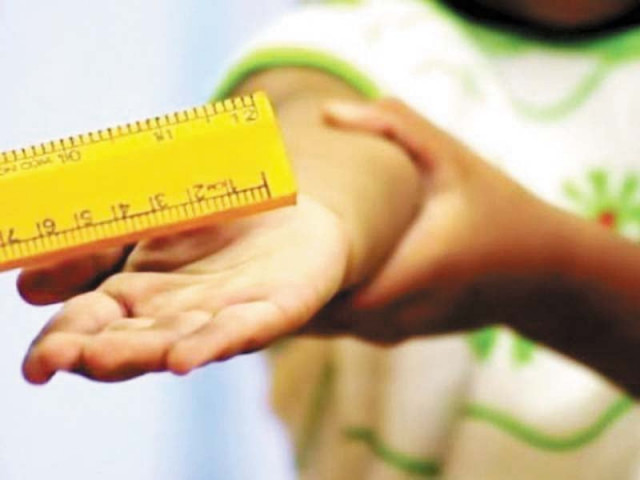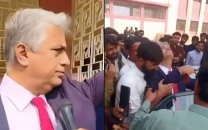No teaching without compassion
Despite efforts by activists, teachers continue to use corporal punishment without fear of repercussions

“[Kids] don’t remember what you try to teach them. They remember what you are,” the renowned puppeteer Jim Henson was once quoted as saying.
His words should be a creed parents and teachers around the world live by. The education system in Pakistan has an ugly legacy of violence and corporal punishment. While some schools in the urban part of the country have move passed the practice, a large number continues the practice without any fear of legal repercussions.
In fact, many teachers in both urban and rural Pakistan employ corporal punishment to overcome their own pedagogical failings.
Lingering trauma
Mustafa did not always plan on being an activist. These days, however, he can no longer sit still if he comes across footage or hears of violence against children. With the help of his social network, he tries his best to intervene.
Two years ago, his then five-year-old son was beaten severely by an evening tutor in his own home. “My family did not resist. They let the teacher off the hook like he did nothing wrong,” Mustafa recalled. “I had been out of the city at the time. When I returned a week later, the dark bruises on my son’s body were still visible.”
Last week, a set of videos of some students receiving corporal punishment went viral. For Mustafa, the videos stirred a very personal anguish. “Time may heal physical scars, but trauma lingers far longer,” he said, commenting on them.
Last month, he tried to reach out after another video of a teacher torturing his students went viral. “I contacted people I knew in Rahim Yar Khan and Shikarpur, but we were unable to reach that school.”
For Karachi resident Sultan Adam, the fact that corporal punishment still persists in schools comes hardly as a surprise. “I have changed my daughter’s school thrice. The last time, it was because I could see her fingers swollen from punishment,” he shared. “My complaint was never entertained.”
A violent mindset
“This is a mindset and we have to fight against it,” said Pakistani celebrity activist Shehzad Roy, who recently released a song titled ‘Chal Parha’ to raise awareness against corporal punishment.
“Physical punishment starts from home. Teachers then repeat the same method at school. That is why we have a violent society.”
Tharparkar-based educationist Partab Shivani acknowledged that there has been some reduction in corporal punishment in schools compared to the 90s. “But it is still common in both rural areas and underdeveloped localities in major cities,” he said.
Shivani pointed out that lack of teaching ability was directly tied with the practice. “Teachers who can’t teach end up resorting to violence and this is a major cause of students dropping out of school,” he said. “We need an effective law to ensure schools provide a child-friendly environment.”
According to activists, Section 89 of the Pakistan Penal Code is a major hurdle to ensuring child protection. In a petition filed by Roy at the Islamabad High Court last year before the pandemic, the court observed that the outdated law is providing impunity to both teachers and other abusive adults.
The legislative question
Despite the several cases that have been reported, hardly anyone who has meted out corporal punishment to children has been punished.
In 2019, Human Rights Watch (HRW) urged the Pakistan government to take measures to end corporal punishment in schools across the country. Referring to the case of Hunain Bilal, a 17-year-old student in Lahore who died due to injuries received after being allegedly beaten by a teacher, the NGO urged the government to “act urgently to end abuse in schools and create a safe environment for Pakistani children to learn without having to fear for their lives.”
HRW, quoting data from the Society for the Protection of the Rights of Child, pointed out that nearly 22.5 million Pakistan children are out of school. Corporal punishment remains a significant reason.
Speaking to The Express Tribune, Roy said that Sindh has initiated the legislation against corporal punishment. “But there is no such law in any other province,” he pointed out. Despite repeated civil society demands, the National Assembly has yet to pass a bill outlawing corporal punishment.
The private schools registrar at the Sindh Education Department said the law had helped bring down the number of corporal punishment incidents in the province.



















COMMENTS
Comments are moderated and generally will be posted if they are on-topic and not abusive.
For more information, please see our Comments FAQ